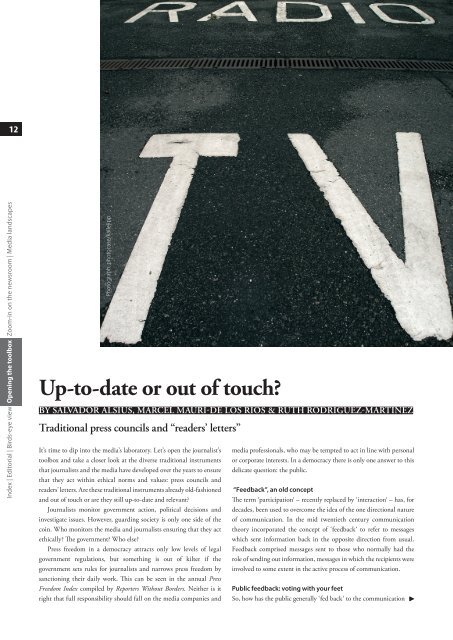MediaAcT
How fragile is media credibility? Accountability and transparency in journalism: research, debates, perspectives Final Research Report | Media Accountability and Transparency in Europe
How fragile is media credibility? Accountability and transparency in journalism: research, debates, perspectives
Final Research Report | Media Accountability and Transparency in Europe
Create successful ePaper yourself
Turn your PDF publications into a flip-book with our unique Google optimized e-Paper software.
1<br />
Index | Editorial | Birds-eye view | Opening the toolbox<br />
| Zoom-in on the newsroom | Media landscapes<br />
1<br />
Photograph: photocase/kallejipp<br />
Up-to-date or out of touch?<br />
By SAlVAdOr AlSiuS, MArcel MAuri-de lOS riOS & ruTh rOdrigueZ-MArTineZ<br />
Traditional press councils and “readers’ letters”<br />
It’s time to dip into the media’s laboratory. Let’s open the journalist’s<br />
toolbox and take a closer look at the diverse traditional instruments<br />
that journalists and the media have developed over the years to ensure<br />
that they act within ethical norms and values: press councils and<br />
readers’ letters. Are these traditional instruments already old-fashioned<br />
and out of touch or are they still up-to-date and relevant?<br />
Journalists monitor government action, political decisions and<br />
investigate issues. However, guarding society is only one side of the<br />
coin. Who monitors the media and journalists ensuring that they act<br />
ethically? The government? Who else?<br />
Press freedom in a democracy attracts only low levels of legal<br />
government regulations, but something is out of kilter if the<br />
government sets rules for journalists and narrows press freedom by<br />
sanctioning their daily work. This can be seen in the annual Press<br />
Freedom Index compiled by Reporters Without Borders. Neither is it<br />
right that full responsibility should fall on the media companies and<br />
media professionals, who may be tempted to act in line with personal<br />
or corporate interests. In a democracy there is only one answer to this<br />
delicate question: the public.<br />
“Feedback”, an old concept<br />
The term ‘participation‘ – recently replaced by ‘interaction‘ – has, for<br />
decades, been used to overcome the idea of the one directional nature<br />
of communication. In the mid twentieth century communication<br />
theory incorporated the concept of ‘feedback‘ to refer to messages<br />
which sent information back in the opposite direction from usual.<br />
Feedback comprised messages sent to those who normally had the<br />
role of sending out information, messages in which the recipients were<br />
involved to some extent in the active process of communication.<br />
Public feedback: voting with your feet<br />
So, how has the public generally ‘fed back‘ to the communication


